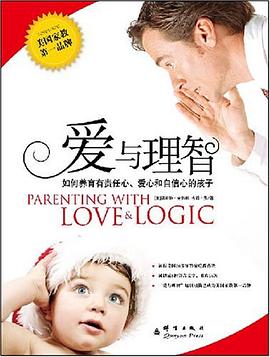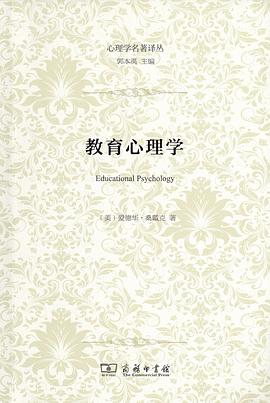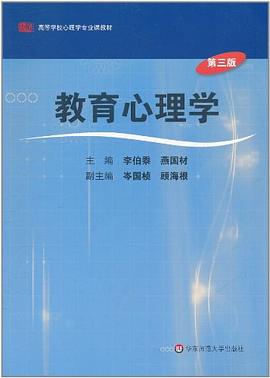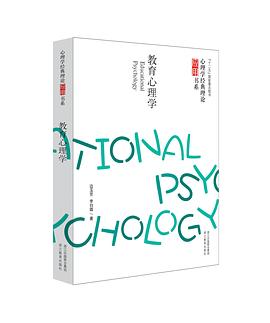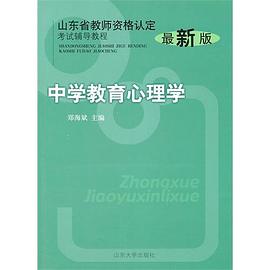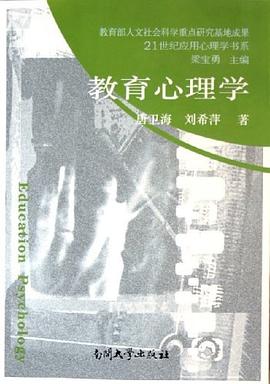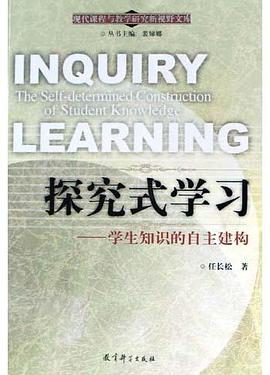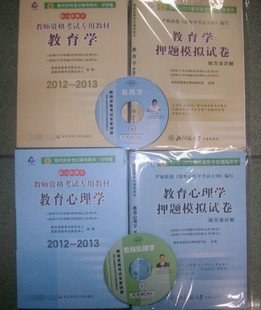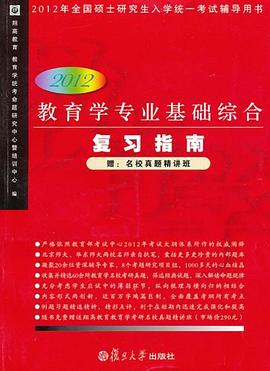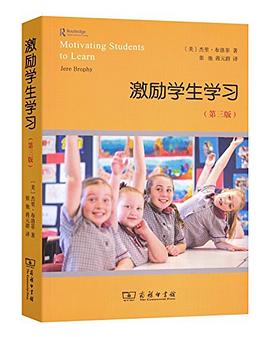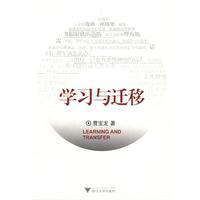

具体描述
《教育心理学:理论与实践》(第10版)在内容体系的构架、事例的科学性、实用性以及可读性等方面堪称典范,第7版引进国内后得到学界的普遍好评,是一部经得起时间检验又与时俱进的优质教材;
作者罗伯特·斯莱文是美国约翰·霍普金斯大学终身教授、教育研究与改革中心主任,英国约克大学有效教育研究中心主任以及“让所有人都成功”基金会主席,曾多次荣获美国教育研究会和国家教育委员会颁发的重要奖项,本书融汇了作者数十年的教学经验和研究成果;
《教育心理学:理论与实践》(第10版)秉承“理论知识与实用策略并举、多元教学理念与方法并存”的宗旨,既如学术专著般全面、严谨、前沿,又具有可读性和实用性,为解决教师在日常课程中遇到的实际问题提供了基于课堂研究的建议;
《教育心理学:理论与实践》(第10版)通过大量的真实案例将理论与实践明确地联系起来,帮助你把教育心理学中学到的知识迁移到自己的教学中去;写作风格让你在阅读它时有身临其境的感觉,似乎能听到学生的话语,闻到学校食堂午餐的香味;
第10版介绍了多个主题的研究以及实践应用,更新了656篇参考文献,2000年以后的文献占全部参考文献中的55%,反映了近十年来教育心理学及教育实践的*发展和趋势;
中国心理学界泰斗张厚粲教授、中国心理学会教育心理学专业委员会主任陈英和教授倾力推荐;
教育部高等学校心理学教学指导委员会推荐用书。
作者简介
罗伯特·斯莱文(Robert E. Slavin)是美国约翰·霍普金斯大学教育研究与改革中心主任、英国约克大学有效教育研究中心主任以及“让所有人都成功”基金会主席。他于1975 年在约翰·霍普金斯大学获社会关系学博士学位,迄今撰写了200 余篇关于合作学习、能力分组、学校和班级组织、废除种族歧视、纳入主流、研究评论以及实证改革等方面的论文和书中章节。斯莱文博士的著作(包括与他人合著)多达20 部,包括《合作学习》《学校和班级组织》《针对高危学生的有效方案》《预防早期的学业失败》《200万儿童:让所有人都成功》《拉丁裔学生的有效项目》《问责制时代的教育研究》。1985 年,斯莱文博士因应用项目研究而荣获了美国教育研究会(AERA)颁发的雷蒙德·卡特尔早期职业奖;1988 年,他在美国教育研究会主办的学术期刊上获得了帕尔默·约翰逊*论文奖;1994 年获得查尔斯·达纳奖,1998 年获得美国国家教育委员会颁发的詹姆斯·布赖恩特·科南特奖,2000 年获得州首席教育官员联合会颁发的杰出贡献奖;2008年他在美国教育研究会主办的杂志上再次获得帕尔默·约翰逊*论文奖,2009 年获得AERA 研究综述奖。
目录信息
CHAPTER 1 Educational Psychology: A Foundation for Teaching 1
What Makes a Good Teacher? 2
Knowing the Subject Matters(But So Does Teaching Skill)2
Mastering Teaching Skills 3
Can Good Teaching Be Taught? 4
The IntenrionaITeacher 4
21st Century Skills 7
What Is the Role ofResearch in Educational Psychology? 8
The Goal of Research in Educational Psychology 9
TheValue of Research in Educational Psychology toYou the Teacher
Teaching as Deasion Making 9
I THEORY INTO PRACTI(E Teaching as Deasion Making 11
Research+Common Sense = Effective Teaching 12
Research on Effective Programs 12
Impaa of Research on Educational Practice 13
I THEORY INTO PRACTICE How to Be an Intelligent Consumer of Educational Psychology Research 13
What Research Methods Are Used in Educational Psychology? 14
Experiments 15
Correlational Studies 17
Descriptive Research 19
Action Research 20
How Can I Become an Intentional Teacher? 20
Teacher Certificarion 20
Beyond Certification 22
Chapter 1 Summary 24
Key Terms 25
Self—Assessment: Practicing for Licensure 26
MyEducationLab 27
CHAPTER 2 Cognitive,Language,and Literacy Development 28
How Do Children Develop Cognitively? 29
Aspects of Development 30
Issues of Development 30
How Did Piaget View Cognitive Development? 31
How Development Occurs 31
Piaget's Stages of Developmcnt 32
How Is Piaget's Work Viewed Today? 39
Criticisms and Revisions of Piaget's Theory 39
THEORY INTO PRACTICE Educational Implications of Piaget's Theory 39
Neo—Piagetian Views of Development 40
How DidVygotsky View Cognitive Development? 41
How Development Occurs 41
THEORY INTO PRACTICE Classroom Applications of Vygotsky'sTheory 43
How Do Language and Literacy Develop? 44
Language and Literacy Development during the Preschool Years 44
THEORYINTO PRACTICE Promoting Literacy Developmentin Young Children 46
Language and Literacy Development during the Elementary and Secondary Years 47
THEORY INTO PRACTICE Building Vocabularyin Elementary and Secondary Schools 47
Chapter 2 Summary 48
THE INTENTIONAL TEACHER Using What You Know about Development to tmprove Teaching and Learning 48
Key Terms 50
Self—Assessment: Practiang for Licensure 50
MyEducationLab 51
CHAPTER 3 Social,Moral,and Emotional Development 52
What Are Some Views of Personal and Social Development? 53
Erikson's Stages of Psychosocial Development 54
Implications and Cfiticisms of Erikson's Theory 56
What Are Some Views of Moral Development? 57
Piaget's Theory of Moral Development 57
Kohlbergs Stages of Moral Reasoning 58
Criticisms of Kohlberg's Theory 60
How Do Children Develop Socially and Emotionally? 61
Socioemotional Development during the Elementary Years 63
THEORY INTO PRACTICE Promoting the Development of Self—Esteem 65
THEORY INTO PRACTICE Helping Children Develop Soaal Skills 67
Socioemotional Development during the Middle School and High School Years 67
THE INTENTIONAL TEACHER Using What You Know about Early Childhood,Middle Childhood,and Adolescent Students to Improve Teaching and Learning 72
THEORY INTO PRACTICE Preventing Adolescents' Problems 74
Chapter 3 Summary 74
Key Terms 75
Self—Assessment: Practicing for Licensure 76
MyEducationLab 77
CHAPTER 4 Student Diversity 78
What Is the Impact of Culture on Teaching and Learning? 80
How Does Socioeconomic Status Affect Student Achievement? 80
The Role ofChild—Rearing Practices 82
The Link between Income and Summer Learning 83
The Role of Schools as Middle—Class Institutions 84
School and Communiry Factors 84
Promoring Resilience among Students Who Are Disadvantaged 85
School,Family,and Community Parmcrships 85
THEORY INTO PRAaICE Parent Involvement 86
Supporting the Achievement of Children from Low—Income Groups 87
Nonschool Solutions to Achievement Problems of Children Who Are Disadvantaged 87
Implications for Teachers 88
How Do Ethrucity and Race Affect Students' School Experiences? 89
Racial and Ethnic Composition of the United States 89
Academic Achievement of Students from Underrepresented Groups 90
Barriers to the Achievement of Students from Underrepresented Croups 90
Stereotype Threat 92
Effects of School Desegregation 93
THEORY INTO PRACTICE Teaching in a Culturally Diverse School 94
How Do Language Differences and Bilingual Programs Affect Student Achievement? 95
Bilingual Education 95
THEORY INTO PRACTKE Teaching English Learners 96
What Is Multicultural Education? 98
Dimensions of Multicultural Education 98
Global Awareness 100
How Do Gender and Gender Bias Affect Students' School Experiences? 100
Male and Female Thinking and Learning 100
The Boy Crisis 101
Sex—Role Stereotyping and Gender Bias 102
THEORY INTO PRACTICE Avoiding Gender Bias in Teaching 102
How Do Students Differ in Intelligence and Learning Styles? 103
Defmitions of Intelligence 104
THEORY INTO PRACTICE Multiple Intelligences 106
Origins of Intelligence 106
Theories of Learning Styles 107
Aptitude—Treannent Interacrions 107
THEORY INTO PRACTICE Understanding Diverse Thinkers 108
THE INTENTIONAL TEACHER Using What You Know about Student Diversity to Improve Teaching and Learning 108
Chapter 4 Summary 110
Key Terms 111
Self—Assessment: Practiang for Licensure 112
MyEducationLab 113
CHAPTER 5 Behavioral Theories of Learning 114
What Is Learning? 116
What Are Behavioral Leanung Theories? 117
Pavlov: Classical Conditioning 117
Skinner: Operant Conditioning 117
What Are Some Principles of Behavioral Learning? 119
The Role of Consequences 119
Reinforcers 119
THEORY INTO PRACTICE Oassroom Uses of Reinforcement 121
THEORY INTO PRACTICE Practical Reinforcers 122
Punishers 124
Immediacy of Consequences 125
Shaping 126
Extinction 127
Schedules of Reinforcement 128
Maintenance 129
The Role of Anrecedents 130
How Has Social Learning Theory Contributed to Our Understanding of Human Learning? 132
Bandura: Modeling and Observational Learrung 132
THEORY INTO PRACTICE Observational Learning 133
Meichenbaum's Model of Self—Regulated Learning 134
Self—Reliance 136
Strengths and Limitations of'Behavioral LearningTheories 137
Chapter 5 Summary 137
THE INTENTIONAL TEACHER Using What You Know about Behavioral and Social Learning Theory to Improve Teaching and Learning 138
Key Terms 140
Self—Assessment: Practicing for Licensure 140
My Education Lab 141
……
CHAPTER 6 Information Processing and Cognitive Theories of Learning 142
CHAPTER 7 The Effective Lesson 182
CHAPTER 8 Student—Centered and Constructivist Approaches to Instruction 216
CHAPTER 9 Grouping,Differentiation,and Technology 248
CHAPTER 10 Motivating Students to Learn 284
CHAPTER 11 Effective Learning Environments 314
CHAPTER 12 Learners with Exceptionalities 352
CHAPTER 13 Assessing Student Learning 396
CHAPTER 14 Standardized Tests and Accountability 446
Appendix Using This Text to Prepare for the Praxis TM Principles of Learning and Teaching Exam 482
References 497
· · · · · · (收起)
读后感
1 关键词,学习策略,学习类型,学习理论,人格因素,动机因素。 首先,对以上概念进行拓展。 学习策略包括认知策略,元认知策略和资源管理策略。认知策略包括复述,精加工和组织人认知策略包括计划,监管和调节,资源管理策略包括时间监管,努力管理,物理环境,他人支持。 学...
评分1 关键词,学习策略,学习类型,学习理论,人格因素,动机因素。 首先,对以上概念进行拓展。 学习策略包括认知策略,元认知策略和资源管理策略。认知策略包括复述,精加工和组织人认知策略包括计划,监管和调节,资源管理策略包括时间监管,努力管理,物理环境,他人支持。 学...
评分现代教育学的发展已经不是教学经验的简单集合、归纳,而是融合了儿童心理学、生理发育、教育实验等多门类学科的综合运用。因此,在本书中,教学方法的提出并不是以对过往优秀教学经验的罗列,而是不断穿插心理学、儿童生理发展等的实验、研究结论,以证明优秀的教学是有严格的...
评分有计划性的粗略的读了大部分的章节,还是具有很强的实践性的,对于刚出茅庐的未来可能成为的老师的人来说还是很有用的。读的过程中也做了笔记,像如何对待班级里捣蛋的学生,如何制定教学目标,如何验收教学效果,我认为最关键的还是在课上如何吸引孩子的注意力,提高课堂效率...
评分现代教育学的发展已经不是教学经验的简单集合、归纳,而是融合了儿童心理学、生理发育、教育实验等多门类学科的综合运用。因此,在本书中,教学方法的提出并不是以对过往优秀教学经验的罗列,而是不断穿插心理学、儿童生理发展等的实验、研究结论,以证明优秀的教学是有严格的...
用户评价
不知道自己的英语水平提高了还是作者写的太好了 居然读起来一点都不费劲 绝对需要二刷三刷的书 里面有的部分不适用我们 可以选择性越过
评分建议先中后英 反复读
评分第一本从头读到尾的英文原版教材,非常好的教育心理学教科书。本书围绕教育心理学,依次讲述了什么是教育心理学、人的认知语言能力发展、社会道德情绪的发展、学生多样性、行为主义教育的学习理论、认知的学习理论、有效课堂(教师中心取向的教学)、学生中心与建构主义取向的教学、学生差异与差异化教学、技术在教育中的应用、学习动机、有效课堂环境、特殊教育、学生评估、标准化测试与美国教育政策。涵盖了发展心理学、认知心理学、教育社会学、教育技术学、心理测评等多方面与心理学、教育学相关的内容。从学生、教师、教学三方面将教育心理学向我们娓娓道来。教育是一个庞杂的体系,包罗万象,正如作者所说想成为一位好的教师需要“intentional”,不断思考、不断学习,本书为我们提供了大量的资料链接和参考文献,是一本极好的教科书。
评分不知道自己的英语水平提高了还是作者写的太好了 居然读起来一点都不费劲 绝对需要二刷三刷的书 里面有的部分不适用我们 可以选择性越过
评分建议先中后英 反复读
相关图书
本站所有内容均为互联网搜索引擎提供的公开搜索信息,本站不存储任何数据与内容,任何内容与数据均与本站无关,如有需要请联系相关搜索引擎包括但不限于百度,google,bing,sogou 等
© 2025 book.quotespace.org All Rights Reserved. 小美书屋 版权所有


